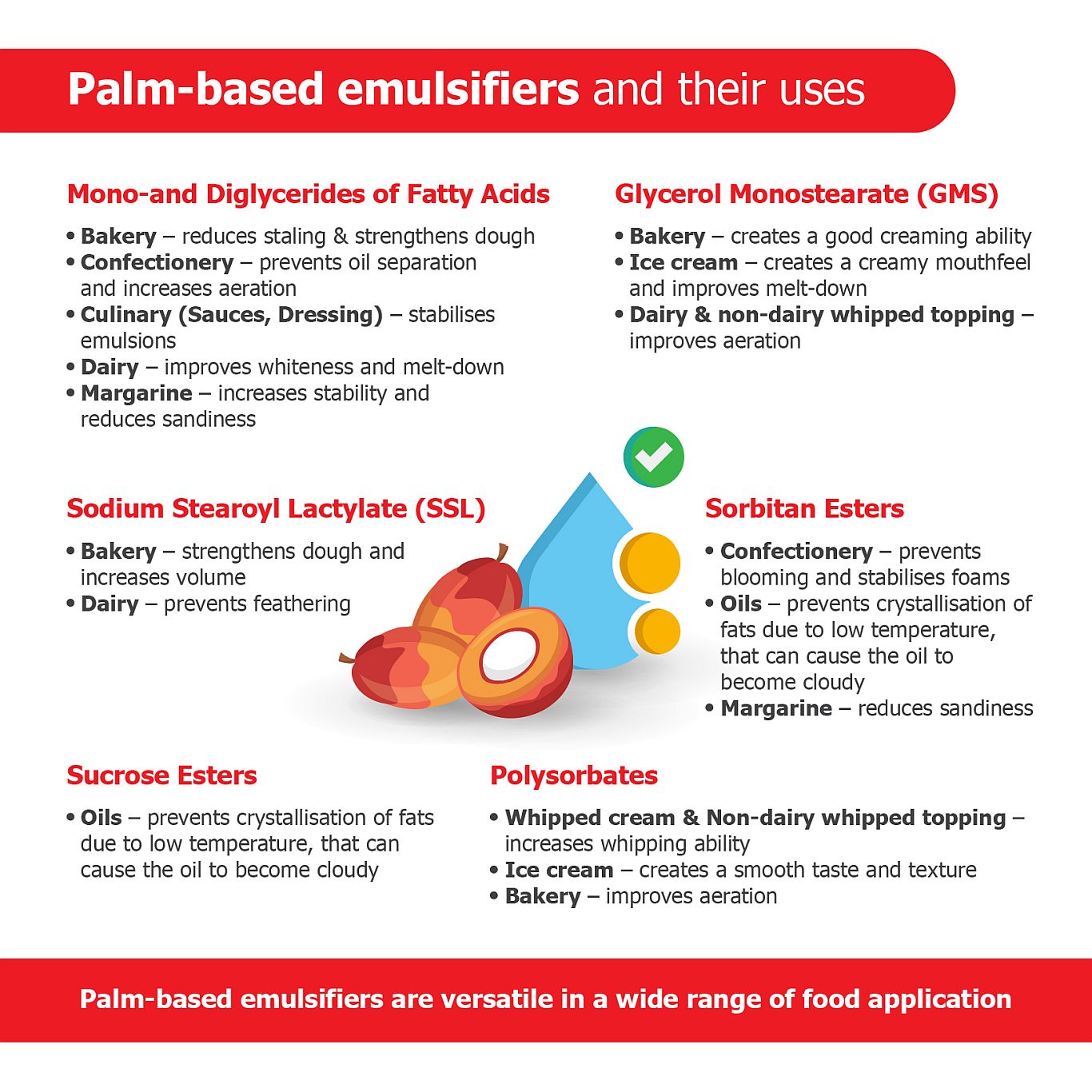Understanding Emulsifiers in Pharmaceutical Applications
Understanding Emulsifiers in Pharmaceutical Applications
Blog Article
The Science Behind Emulsifiers and Their Significance in Modern Production
Emulsifiers play an essential duty in modern-day manufacturing, acting as the unhonored heroes that blend oil and water for a broad variety of products. As customer preferences change towards cleaner labels, the demand for cutting-edge emulsifiers is expanding.
What Are Emulsifiers?
Emulsifiers are important representatives in the globe of food and item manufacturing, acting as the glue that binds 2 otherwise immiscible liquids, like oil and water. Typical instances include lecithin found in egg yolks and soybeans, and mono- and diglycerides used in various processed foods.

When you whip up a salad dressing or delight in a velvety treat, emulsifiers aid preserve that ideal texture. Without emulsifiers, many foods would certainly divide, leading to undesirable appearances and tastes.
The Chemistry of Emulsification
When you blend oil and water, you may discover they do not mix easily; that's where the chemistry of emulsification comes right into play. To overcome this obstacle, emulsifiers are used.
These particles have a hydrophilic (water-attracting) head and a hydrophobic (water-repelling) tail. When you add an emulsifier, its molecules position themselves at the oil-water interface, minimizing surface area tension and permitting the droplets to blend. The emulsifier develops a protective layer around each bead, avoiding them from coalescing back right into different layers. Understanding this chemistry is vital for accomplishing stability in products like dressings, creams, and sauces, making emulsification necessary in contemporary production.
Kinds Of Emulsifiers
Numerous kinds of emulsifiers play important functions in supporting combinations of oil and water. All-natural emulsifiers, like lecithin from egg yolks or soy, are acquired from plants and pets, making them preferred in food items.
On the other hand, artificial emulsifiers, such as mono- and diglycerides, are chemically engineered to improve security and life span. They're frequently utilized in processed foods and aesthetic products.
Furthermore, you could come across non-ionic, anionic, and cationic emulsifiers, each with unique homes that affect their efficiency. Non-ionic emulsifiers, as an example, work well in a variety of pH degrees, while anionic emulsifiers often tend to carry out far better in alkaline problems. Recognizing these kinds can assist you choose the ideal emulsifier for your particular application.
Devices of Emulsion Development
Recognizing exactly how solutions form is important for producing stable mixes of oil and water. When you introduce an emulsifier, it lowers the surface tension between the two fluids, allowing them to mix more quickly.
The emulsifier molecules have a hydrophilic (water-attracting) head and a hydrophobic (oil-attracting) tail. When you add an emulsifier, these particles prepare themselves at the oil-water user interface. The hydrophilic heads communicate with water, while the hydrophobic tails secure into the oil. This produces a barrier that maintains the beads, avoiding them from coalescing.
Applications of Emulsifiers in Numerous Industries
Emulsifiers play a vital function across different sectors, making your favorite foods smoother and a lot more delightful. In cosmetics, they enhance item appearance and stability, ensuring an enjoyable application experience. And also, in drugs, they help provide essential active ingredients effectively, improving total efficiency.
Food Industry Uses
While you could not understand it, emulsifiers play an essential duty in the food sector, enhancing the texture, security, and service life of lots of products (Emulsifiers). They're generally found in salad dressings, sauces, and mayo, aiding to mix oil and water for a smooth, regular item. In baked items, emulsifiers boost dough handling and preserve dampness, leading to a much better appearance and extended freshness. They're likewise important in milk items, where they maintain emulsions in lotions and ice creams, protecting against separation. Even in snacks, emulsifiers assist maintain crunchiness and protect against stagnant flavors. By making sure harmony and quality, emulsifiers are significant to providing the scrumptious items you delight in every day, making them an important active ingredient in modern food production.
Cosmetic Formulations Advantages
When look these up it comes to cosmetic formulations, emulsifiers are vital for producing products that really feel elegant and perform effectively. You'll observe that emulsifiers improve product security, protecting against splitting up and extending shelf life. On the whole, emulsifiers play an essential function in delivering top notch cosmetic items that meet your appeal requirements.
Pharmaceutical Applications Overview
In the pharmaceutical market, emulsifiers are important for creating reliable drugs. They help create stable combinations of oil and water, guaranteeing that energetic components are evenly distributed and conveniently taken in by the body. You'll locate emulsifiers in various dose forms, like creams, ointments, and fluid suspensions, improving the bioavailability of medications. They likewise improve the texture and stability of products, making them much more attractive and easier to use.
The Influence of Emulsifiers on Product Top Quality

By ensuring stable emulsions, you decrease the threat of putridity and extend life span, ultimately saving you time and cash. You'll likewise locate that emulsifiers can improve the bioavailability of active ingredients in your products, making them more reliable for customers.
In addition, they enable you to create innovative solutions that satisfy varied consumer requirements. Whether you're crafting a luscious dressing or a glamorous lotion, emulsifiers are important for accomplishing the wanted results. In brief, by recognizing and leveraging the influence of emulsifiers, you can greatly raise the top quality of your items.
Future Trends in Emulsifier Development
As the need for cleaner labels and lasting items increases, the growth of brand-new emulsifiers is readied to progress significantly. You'll see a shift in the direction of plant-based and natural emulsifiers, driven by customer choices for ingredients that are eco pleasant and much less processed. web link Innovations in biotechnology will likely boost the capability and performance of these emulsifiers, enabling makers to develop stable formulas with less ingredients.
You might also see a rise in multifunctional emulsifiers that not only maintain emulsions yet likewise boost taste, texture, or nutritional worth. This trend can simplify component lists while enhancing product efficiency.
Moreover, with breakthroughs in nanotechnology, emulsifiers can be crafted read here at the molecular degree to achieve extraordinary security and effectiveness. Emulsifiers. As you discover these fads, you'll locate that the future of emulsifier advancement is not nearly capability, yet also regarding welcoming sustainability and transparency in active ingredients
Regularly Asked Questions
Are Emulsifiers Safe for Consumption in Food Products?
Yes, emulsifiers are normally safe for consumption in food. They've been extensively studied and approved by food safety authorities, so you can appreciate your preferred foods without fretting about their influence on your health and wellness.
Can Emulsifiers Be Derived From All-natural Sources?
Yes, you can derive emulsifiers from all-natural sources. Components like lecithin from egg yolks or soybeans and casein from milk are typical. These natural emulsifiers help stabilize mixes without artificial ingredients, making them preferred in different products.

How Do Emulsifiers Influence Life Span of Products?
Emulsifiers support blends, stopping separation and putridity - Emulsifiers. By keeping uniformity, they prolong items' life span, ensuring quality and quality. You'll notice that emulsifiers help maintain your preferred foods and cosmetics doing well over time
What Are Prospective Adverse Effects of Emulsifiers?
You could experience digestive issues when consuming items with emulsifiers, as they can interfere with digestive tract microorganisms. Some researches recommend possible web links to swelling or allergies, yet a lot more research study is required to completely comprehend these effects.

Are There Alternatives to Typical Emulsifiers?
Yes, there are options to typical emulsifiers. You can check out alternatives like natural periodontals, starches, or lecithin. Each alternate offers special homes, so experiment to discover what jobs best for your particular application.
Report this page